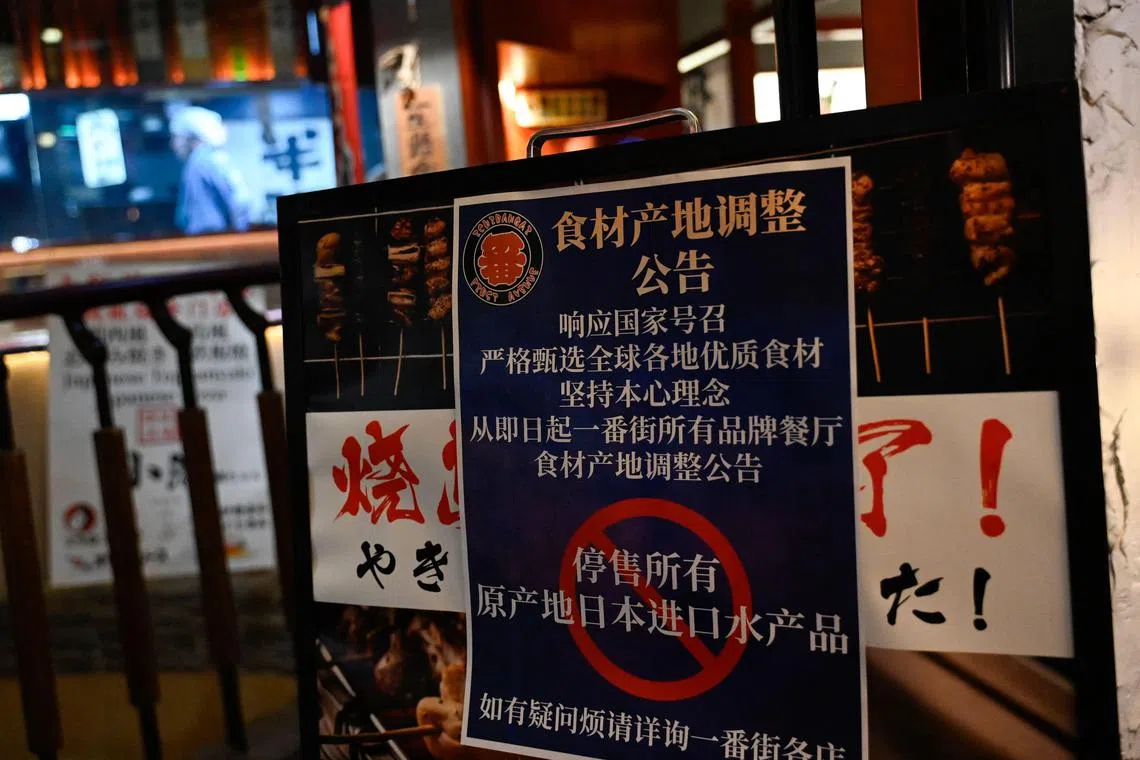Japan says harassment calls from China regarding Fukushima water release ‘extremely regrettable’
Sign up now: Get ST's newsletters delivered to your inbox

A sign reading "Suspend the sale of all fish products imported from Japan" at an area with Japanese restaurants in Beijing on Aug 27.
PHOTO: AFP
Follow topic:
TOKYO – Japan’s top government spokesman said on Monday that it was extremely regrettable there were many instances of harassment phone calls from China release of treated water from the Fukushima nuclear power plant into the Pacific Ocean.
The Chinese Embassy in Tokyo said that it, too, had been receiving nuisance calls – from Japan.
Japan last Thursday started the water discharge, a key step in decommissioning the Fukushima plant, which suffered triple meltdowns after being hit by a tsunami in 2011 following a powerful earthquake.
China strongly opposes the discharge.
“A lot of harassment phone calls believed to be originating from China are occurring in Japan... These developments are extremely regrettable and we are concerned,” Japan’s Chief Cabinet Secretary Hirokazu Matsuno told a regular news conference.
The harassment calls prompted Vice-Foreign Minister Masataka Okano to summon the Chinese ambassador, Japan’s Foreign Ministry said.
In a statement, the ministry said the calls were also occurring at Japanese facilities in China, and urged the government to take appropriate action promptly and ensure the safety of Japanese citizens.
When asked about the harassment accusations at a regular briefing on Monday, a spokesman for China’s Foreign Ministry said it was not aware of the matter.
But the Chinese Embassy in Tokyo released a statement saying it had lodged stern representations with Japan about the embassy and consulates in Japan receiving “a large number of nuisance calls from Japan”.
The calls have caused “serious interference in the normal operation of the embassy and consulates”, Ambassador Wu Jianghao said, according to an embassy statement.
Japanese Prime Minister Fumio Kishida said the government had “strongly” requested Beijing to urge its citizens to act “calmly and responsibly” after incidents of stone-throwing were also reported at a Japanese school and an embassy.
The Fukushima city hall started getting calls with the country code “86”, which is for China, last Thursday, and the number of such calls exceeded 200 the following day, flooding phone lines and disrupting city employees’ ordinary work, an official said.
On the same day, elementary and junior high schools in the city, 60km north-west of the crippled plant, received 65 similar calls, he said.
When a person who understood Chinese took one of those calls, the caller made a comment to the effect of “why are you releasing tainted water into the Pacific Ocean, which is a sea for everyone”, the official said.
Other municipalities, hotels and restaurants have also been getting such calls since the day the water release began, said the domestic media.
In China, a rock was thrown at a Japanese school in the coastal city of Qingdao last Thursday, according to Japan’s consulate-general in the city.
When asked about the incident in Qingdao and the harassment calls, Chinese Foreign Ministry spokesman Wang Wenbin defended China’s record of keeping foreigners safe.
“China always safeguards the safety and lawful rights and interests of foreign nationals in China in accordance with law,” he said.
Fukushima plant operator Tokyo Electric Power Company (Tepco) has been filtering the contaminated water to remove isotopes, leaving only tritium, a radioactive isotope of hydrogen that is hard to separate.
Tepco dilutes the water until tritium levels fall below regulatory limits before pumping it into the sea.
China, however, said the Japanese government had not proved that the water discharged would be safe, and issued a blanket ban on all aquatic products from Japan hours after Tokyo went ahead with the release. REUTERS

